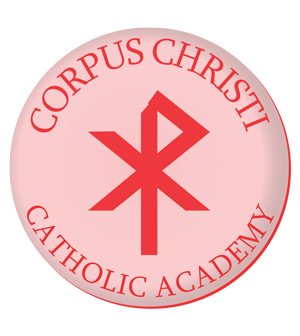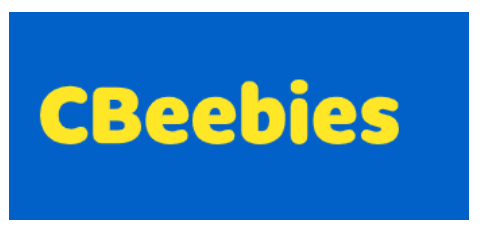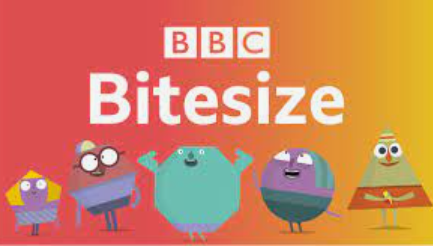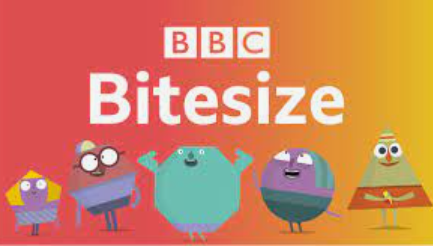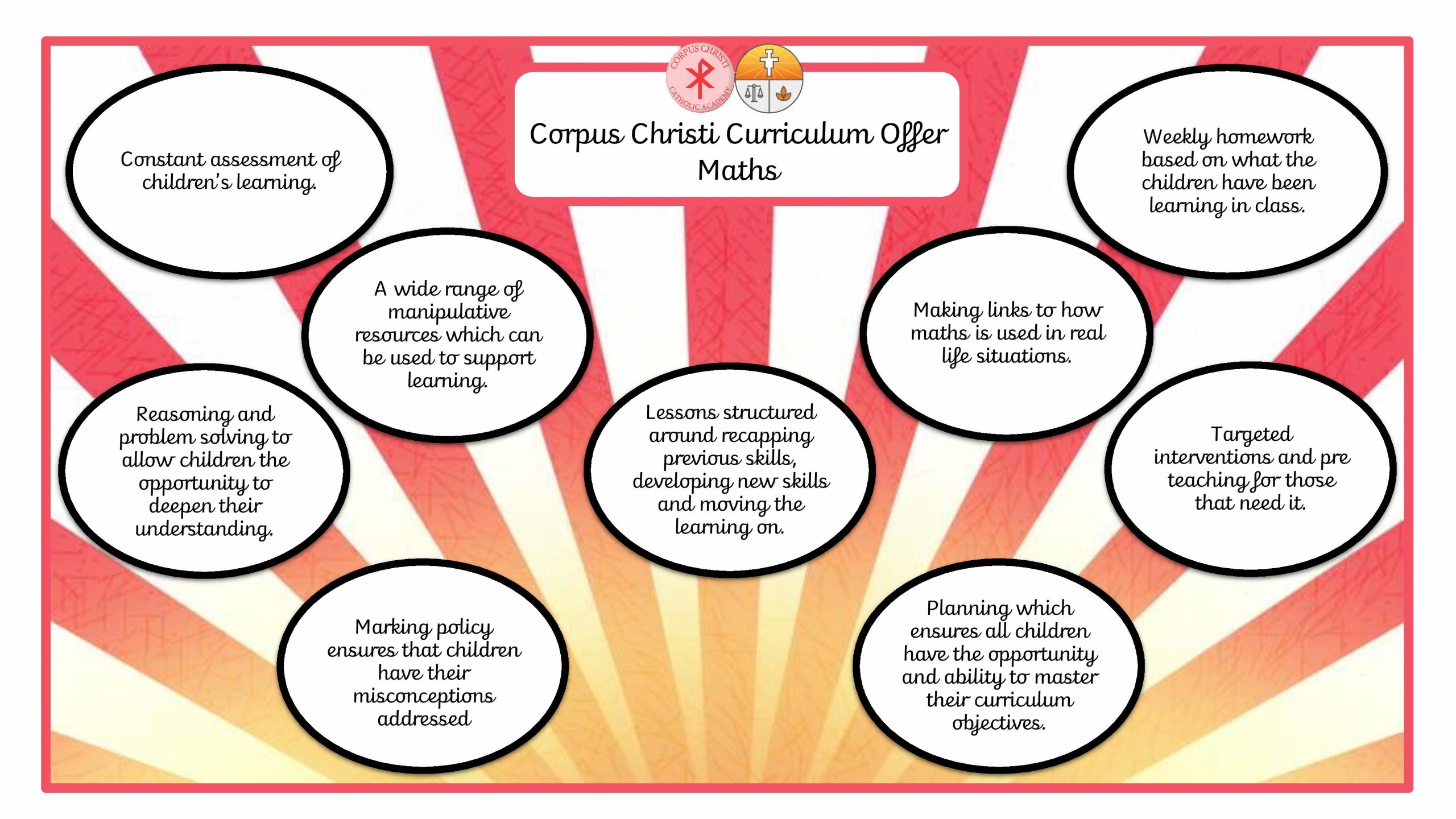
At Corpus Christi Primary Academy all of our learning is centred around the 2014 National Curriculum. In Maths the aims are to ensure that all children in our care:
Intent
- Become fluent in the fundamentals of mathematics, including through varied and frequent practise with increasingly complex problems over time, so that pupils have conceptual understanding and are able to recall and apply their knowledge rapidly and accurately to problems
- Reason mathematically by following a line of enquiry, conjecturing relationships and generalisations, and developing an argument, justification or proof using mathematical language
- Can solve problems by applying their mathematics to a variety of routine and non-routine problems with increasing sophistication, including breaking down problems into a series of simpler steps and persevering in seeking solutions.
When teaching mathematics at Corpus Christi, we intend to provide a curriculum which is centred around the individual needs of our pupils. We incorporate challenge by delivering a range of activities which have a focus on mastering skills and moving children’s learning on within each lesson. We also ensure that problem solving and reasoning are a key daily focus. Pupils are encouraged to explore maths in depth, using mathematical vocabulary to reason and explain their understanding. We are committed to ensure that children are able to recognise the importance of maths in everyday life and apply their skills to real-life contexts. We encourage resilience in Maths and are committed to developing children’s curiosity about the subject, as well as an appreciation of the beauty and power of Mathematics. We tailor our curriculum for the needs of our children at Corpus Christi by ensuring that our Maths teaching meets the expectations set by our Curriculum Drivers which can be found on a separate document.
Implementation
The following principles underpin Maths teaching at Corpus Christi and they are closely linked to our virtues and values and also our Curriculum drivers.
- Teachers reinforce an expectation that all children are capable of achieving high standards in Mathematics.
- The large majority of children progress through the curriculum content at the same pace.
- Differentiation is achieved by emphasising moving children’s learning on and through individual day to day support and daily intervention.
- Teaching is underpinned by methodical curriculum design and supported by carefully crafted lessons and resources to foster deep conceptual and procedural knowledge.
- Practice and consolidation play a central role. There is a carefully designed variation within this which builds fluency and understanding of underlying mathematical concepts.
- Teachers use precise questioning in class to test conceptual and procedural knowledge and assess children regularly to identify those requiring intervention, so that all children keep up. From this, staff will move children onto a teacher table during each lesson to ensure gaps or misconceptions are immediately addressed.
To ensure consistency and progression, staff follow a clear structure within their maths lessons. All children are presented with concrete, pictorial and abstract questions. Concrete resources are also to be used in Key Stage 2 to ensure they are fully embedding their knowledge. Teachers introduce children to key vocabulary and use careful questions to draw out the children’s reasoning. Independent work provides the means for all children to develop their fluency further, before moving their learning on in a range of reasoning and problem solving activities, which are often linked to real-life contexts.
Mathematical units are taught in blocks to enable the achievements of mastery over time. To support us, we have a range of mathematical resources in classrooms including: Numicon, Base10, number squares, number lines, tens frames, cubes, counters, 2D and 3D shapes, a variety of measuring equipment, money and clocks. We also use a range of planning tools, including those provided by the White Rose, NCETM and Master the Curriculum,. We continuously strive to better ourselves and frequently share ideas and strategies that have been particularly effective. We also take part in training opportunities and regional networking events.
Through our teaching, we continuously monitor pupils’ progress against expected attainment for their age, making formative assessment notes where appropriate and using these to inform our discussions in termly Pupil Progress Meetings which leads onto updating our summative school tracker. The main purpose of all assessment is to always ensure that we are providing excellent provision for every child.
Impact
The impact our curriculum has on our children:
- Children are happy learners within mathematics. They experience a wide-range of learning challenges in the subject and know appropriate responses to them.
- Through mathematics, children deepen their appreciation of their faith and fulfil their God-given talents.
- Children of all abilities and backgrounds achieve well in mathematics, reflected in good progress that reveals a clear learning journey. Children talk enthusiastically about their learning in mathematics and are eager to further their learning in the next stages of their education.
- Children are encouraged to aspire to be good mathematicians and recognise wider contexts of mathematical based jobs.
- Clear outcomes focus and guide all mathematical development plans and drive improvement.
- Children will become fluent in the fundamentals of mathematics. Through varied and frequent practice with increasingly complex problems over time, pupils will have the conceptual understanding and the ability to recall and apply knowledge rapidly and accurately.
- Children will be able to reason mathematically by following a line of enquiry, conjecturing relationships and generalisations, developing an argument, justification or proof using mathematical language.
- Children will solve problems by applying their mathematics in a variety of problems with increasing sophistication, including breaking down problems into a series of simpler steps and persevering to seek solutions.
- Fundamental British Values are evident in mathematics and children understand how mathematics can celebrate difference.
- We aim to adapt our mathematics to suit the particular needs of our children by making explicit links to our curriculum drivers – see our curriculum drivers document.
Please click on the links below to find out more about our Maths planning.
At Corpus Christi we are currently teaching a curriculum to support the children in any learning which they have missed due to the pandemic therefore we have adapted our maths Long Term Plan for this academic year. The adaptations ensure that the children are being taught the specific skills which will benefit and support them ready for moving up to the next school year. These changes are based on the Ready to Progress documents.
Maths Documents
Please view the additional documents in school:
- Maths Knowledge and Skills Progression
- Maths Vocabulary Progression
- Maths Unit Markers
